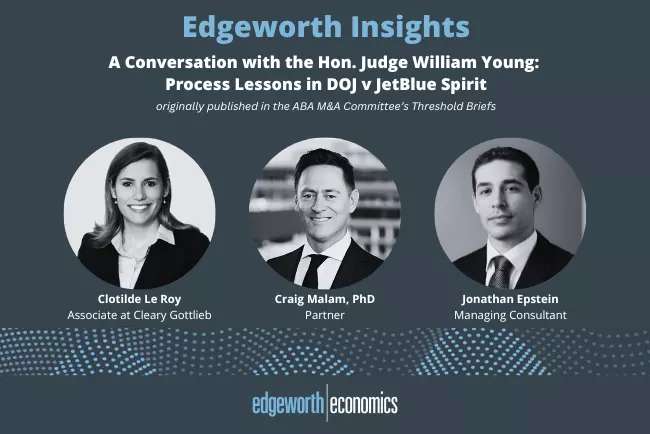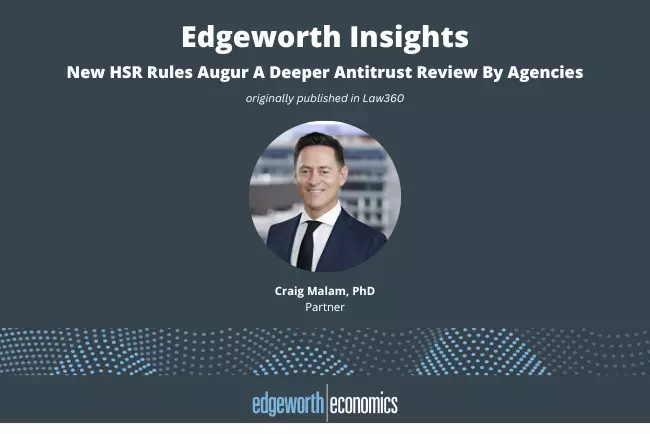Publications
Edgeworth experts publish in a variety of scholarly and trade journals on a range of topics including economics, legal cases, and data analytics. Discover our most recent thoughts and findings here.
- Published Article, ABA Antitrust Section M&A Committee Newsletter | 03.11.2025
On February 13, 2025, the Antitrust Law Section hosted a webinar with Judge William Young of the U.S. District Court for the District of Massachusetts. The webinar, titled Process Lessons in DOJ v JetBlue Spirit, was moderated by Dr. Craig Malam, Partner at Edgeworth Economics, and Clotilde Le Roy, Associate at Cleary Gottlieb Steen & Hamilton LLP.
- Published Article, Law360 | 03.07.2025
This article will examine how the rule changes are to affect agency economists' analysis during the initial waiting period and the effect on how the agencies target or identify from among all notified transactions those that warrant in-depth reviews.
- Our Curious Amalgam | 03.03.2025
Private class action lawsuits play a significant role in the vindication and development of U.S. antitrust law. But what are attorneys and courts to do when they know there's an injured class, but are not quite sure who's in it and who's not?
- Published Article, ABA Antitrust Source | 02.28.2025
In this article, we trace the evolution of economic theories in “algorithmic collusion” litigation and describe a framework for the antitrust injury and damages issues that will be relevant as these cases proceed.
- Published Article, Journal of Direct Selling Research | 01.24.2025
On April 30, 2024, the FTC published updated Business Guidance Concerning Multi-Level Marketing that details the current principles and practices that the FTC considers in its assessment of whether an MLM is offering an unlawful compensation structure and operating as a pyramid scheme.
- Law360 | 12.10.2024
In the November election, California voters narrowly rejected Proposition 32, which would have increased the state's minimum wage.
- CPI Antitrust Chronicle | 12.02.2024
This article explores the economic dynamics and competition issues within the fast-advancing Generative Artificial Intelligence (AI) industry. Generative AI, encompassing hardware, models, and applications, has seen rapid growth across sectors, offering potential for efficiency gains and innovation.
- ABA Antitrust Law Section’s Economics Committee | 11.14.2024
“Dark patterns” is a term used to describe potentially deceptive app or website designs that could manipulate consumers to make choices they would otherwise not make.
- Published Article, Competition Journal of the Antitrust and Unfair Competition Law Section of the California Lawyers Association | 10.23.2024
In class action litigation, a court’s decision as to whether a particular class should be certified turns, in part, on the question of predominance. In antitrust class actions in particular, the predominance assessment relies heavily on economic analysis.
- Published Article, Bloomberg Law | 09.18.2024
Pharmaceutical manufacturers introduce new and improved versions of drugs as part of their research and development strategy. However, concerns about antitrust violations are raised when manufacturers are alleged to use anticompetitive tactics to stifle generic competition.
- Published Article, Bloomberg Law | 08.21.2024
In the last year, the Federal Trade Commission (FTC) has taken several actions to challenge patents listed in the Food and Drug Administration's (FDA) Orange Book.
- Published Article, Law360 | 08.13.2024
On June 6, a motion for summary judgment was granted in In re: Lipitor Antitrust Litigation, dismissing claims of a pay-for-delay settlement from Pfizer Inc., the manufacturer of Lipitor, to Ranbaxy.
- Published Article, Law360 | 08.09.2024
On April 30, the FTC published updated business guidance concerning multilevel marketers, or MLMs. This 2024 guidance details the current principles and practices that the FTC claims to consider in its assessment of whether an MLM is offering an unlawful compensation structure and operating as a pyramid scheme.
- Published Article, Bloomberg Law | 07.11.2024
Edgeworth experts Dr. George Korenko and Dr. Tram Nguyen describe FTC actions and recent court decisions and how they affect the recent state of economic analysis of antitrust impact for these alleged patent practices in the pharmaceutical industry.
- Published Article, ABA Antitrust Law Section | 06.13.2024
The Federal Trade Commission (FTC) and U.S. Department of Justice (DOJ) are continually focused on investigating the impact of consolidation in healthcare. More recently, the agencies have expressed a renewed interest in for-profit medicine.
- Published Article, Law360 | 06.06.2024
In April, the U.S. Department of Labor issued its final overtime rule,under which the salary level for the white-collar Fair Labor Standards Act overtime exemption will be $1,128 per week, effective January 2025.
- Published Article, GCR Data and Antitrust Guide | 05.20.2024
Edgeworth experts Matt Milner, Sophie Meadows, Ashley Zhou, and Monica Zhong highlight the importance of economic analysis in assessing competitive harm in data-focused industries in the Global Competition Review Data and Antitrust Guide.
- Published Article, ABA Antitrust Section Economics Committee | 05.09.2024
The ABA Antitrust Section’s 2024 Spring Meeting panel “Failure to Communicate? Improving Expert Testimony” provided a lively discussion about the evolving role of the expert witness, what makes an effective expert witness, and changing trends in trial procedure that may help streamline expert testimony.
- Published Article, Law360 | 05.01.2024
To comply with the Immigration and Nationality Act, the U.S. Department of Labor requires that H-2B visa workers, who are employed in less-skilled seasonal work, must be paid at least the prevailing wage for their occupation and work location.
- Published Article, CPI Antitrust Chronicle | 04.30.2024
In this piece published in the CPI Antitrust Chronicle, Edgeworth experts Tram Nguyen and Connor Moynihan review recent criminal antitrust cases involving expert witness testimony to highlight the types of economic analyses that were utilized in these matters and discuss the likely increase in reliance on expert economic testimony in the future.
- Published Article, Bloomberg Law | 04.12.2024
Mike Kheyfets compiled a unique database of over 100 BIPA settlements and studied the evolution of damages issues BIPA litigation cases. The research, including a look ahead to what the findings may mean for the future, were published today in Bloomberg Law.


